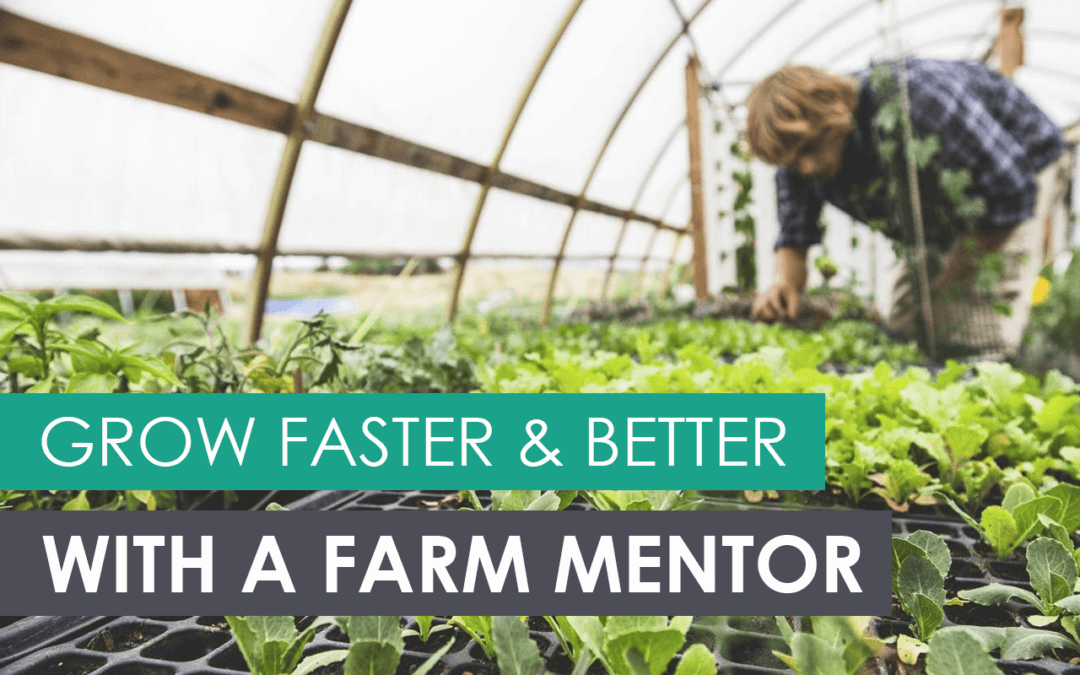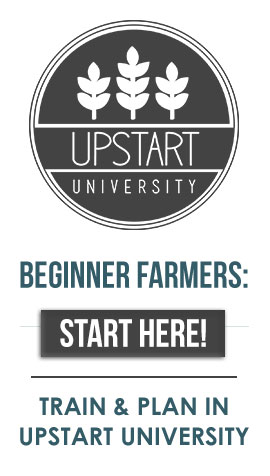Catalyze your learning curve with a farm mentor
Learning to grow, harvest, and sell crops can create an intimidating learning curve for new farmers.
This is where mistakes are made and technical problems inevitably crop up to test your resolve as a new farmer.
Wise farmers understand that the learning curve is a natural part of learning any new skill, but also know that the learning curve can be shortened with a good mentor or advisor.
A great mentor can help with big-picture questions like target markets, technical requirements, and shipping. They can also address smaller, more personal concerns, like managing time or money. That’s not to mention all of the little tips, tricks, and hacks you’ll pick up from your mentor.
In short, the right farm mentor can help cover the gaps in your personal experience in a way that helps save you time and money!
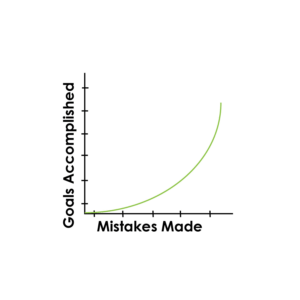
The learning curve is real! Shorten the curve by finding the right mentor.
Find a great mentor by following the tips below.
What type of mentor?
Different types of mentors will be useful at different times. We see there are three main types:
The Peer Mentor: A peer mentor is a fellow farmer or aspiring farmer that’s a few months to decades ahead of you. They will be experiencing the same sort of pains and potential problems, but are usually ahead of you in solving them.
The best place to get in touch with a peer mentor is a farming group you have in common. (The Upstart University Facebook Group is a great avenue.)
That said, you don’t necessarily need to meet frequently or talk in person with your peer mentor. If they’re vocal in forums, blogs, or social media, start there. Pay attention to what they’re posting and the challenges they’re facing, but most importantly TAKE PART in the discussions!
Indirect Mentor: The indirect mentor is less of a personal resource and more of an inspiration.
These mentors are business moguls, lifestyle gurus, and other people who have demonstrated success worth studying. Of course, few of these mentors will be directly connected to farming, but the lessons they can teach are often universally applicable, especially for running a scrappy modern farm.
Books and podcasts allow farmers like you to soak up years of someone’s personal experience of overcoming struggles or defying the odds in just a few hours of reading or listening!
Tip: Look for proven results. Pick an indirect mentor that’s more than just talk. Look for folks who are running a successful farm, business, or approach.
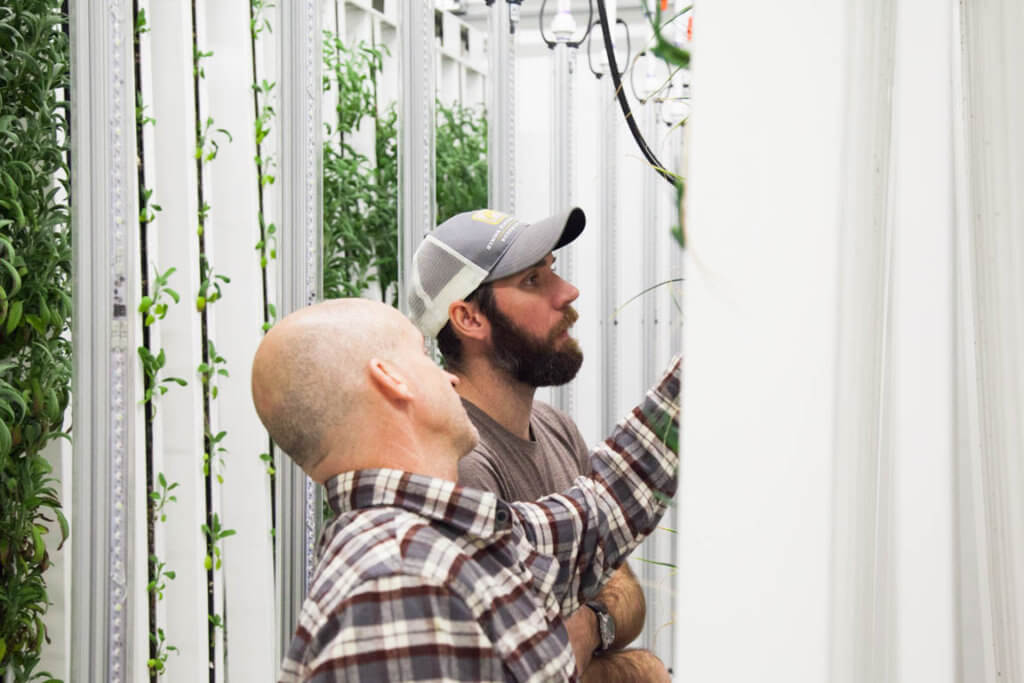
The Advisor: Advisors are direct links to resources like experience, written resources, reference material, equipment, etc.
Advisors, unlike mentors, have the expertise to offer you advice based on your specific situation. They have a dedicated channel for contact, and the relationship is much more structured than that of a mentor.
Tip: Seek people with values that align with yours. Your mentor needs to understand your pain points and priorities. Their advice will impact many of your decisions. Choose a mentor who has similar values to yours and you’ll be heading in the right direction in no time.
Get the most out of your mentors
To make your mentor and advisor relationships valuable, always be thinking about how to use them best. Invest real time in learning from the pros. Here are a number of ways to strategically use your mentors and advisors.
Start early
The best time to find peer and indirect mentors is when you begin planning your farm. Pay attention to sources as you plan your business, create feasibility studies, and learn to grow, and you’ll start seeing people whose approach and values you want to emulate.
Create habits
It’s easy to push learning to the back burner when you’ve got a lot to accomplish, but you’ll regret it later. Create regular places in your schedule to learn and research. Allot a certain amount of time per week to explore relevant resources.
Leverage technology
Social media is one of the best ways to find like-minded farmers and role models. Facebook, Twitter, and Instagram are filled with hashtags that mark the topics, questions, and resources that farmers just like you are using. Find groups, make connections and hold each other accountable for the results you want to achieve.

While some farm mentors might be very professional, most will be regular folks like the rest of us! Don’t judge your potential mentors by their appearance.
Respect your advisor’s time
To foster a valuable advisor/advisee relationship, you must find a contact schedule that is frequent enough to inform your decisions but not so frequent that it annoys the advisor. Usually, advisors and mentors are juggling their schedule to help you out, so be thoughtful of their time. We’ve found that a frequency of about 2 weeks is right for most farmers to check in and then execute on their goals in the meantime.
Take initiative
Elesif McDonald, and her team of professional Farm Advisors at Bright Agrotech, say that the perfect advisee is one that wants guidance, not hand-holding. If a farmer starts the advising relationship without a clue of what they want or how to start, the advisor has to spend a lot of time answering questions that the farmer could have easily found in a Google search. The bottom line there: You have to know what you want! No one can tell you what to do or what goals to set.
“Being prepared is huge,” says Elesif. “If [the farmers] have done some basic research, both on the method and market, and have some basic assumptions in place in terms of square footage, crops, etc., then we can focus on the difficult items in their planning; the ones that they actually need help for.”
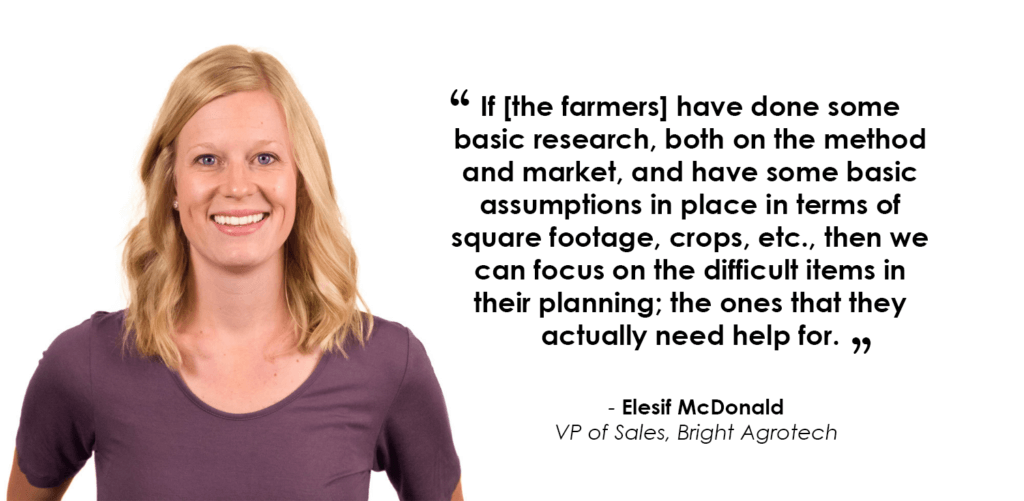
Actually listen to advice
A second advisor here at Bright Agrotech is Ian Friderich, who describes the advising process as a dart board. When the advisor and advisee start meeting, the darts hit the outside rings. Through check-ins, feedback, and goal-oriented hustle, each meeting brings them closer to the bullseye. If a farmer doesn’t respond to feedback or isn’t serious about taking the next step, it wastes everybody’s time and the farmer ends up just spinning his/her wheels.
Ian is currently working with a motivated farmer who’s using advising as a way to move towards his goals faster. Here’s how Ian describes the relationship: “He goes through our online info, webinars, YouTube videos, blog posts, and Upstart U. He schedules time with me when he has questions, follows the advice I give him, then touches base every couple weeks or so. We’ve been working with aspiring farmers for a long time now and we know what they should do or what to avoid to stay on track towards launching a vertical farm.”
Finding the right mentor/advisor

Here are some examples of potential mentors:
Peer mentors:
If you’re an Upstart University student, connect with others on Facebook community page. Get to know farmers in your area. Follow small business operators (non-farming related). Meet other farmers at conferences and tradeshows, entrepreneur clubs, etc.
Indirect mentors:
Follow people on social media (here are some of our favorites) (remember you can always unsubscribe):
- American Heartland Acres
- Fable: From Farm to Table
- Good Taste Farm
- Profeta Farms
- Blue Roots Farm
- Growing North
Another great avenue for finding indirect mentors are authors, writers, and experts in your chosen field. Some popular farm authors are:
- Wendell Berry
- Michael Pollan
- Jean-Martin Fornier
- Howard Resh
- Chris Newman
- Curtis Stone
Advisors:
It can be tough to find a farm advisor. Advisors need to have your best interest at heart, be willing to advise you and be experts. Many find advisors through consulting or programs like the Australia-based Cultivate Farms, which match retiring farmers with young farmers. Some companies like Bright Agrotech offer intensive support for the equipment they manufacture, especially for large support-needy builds. (Learn more about Bright Agrotech farming paths.)

Conclusion
Mentors and advisors make starting a successful farm a much simpler process. Let someone who’s already lived the risks of the farming learning curve set you up for success by saving money, reducing mistakes, and keeping you on track towards a focused goal.
Choose mentors who are experts in your type of farming, make sure they’ll have the tools and time to help your work, and don’t be afraid to shop around!
Get started today with farming advice, lessons, and mentorship at Upstart University! Click here for a free trial.

